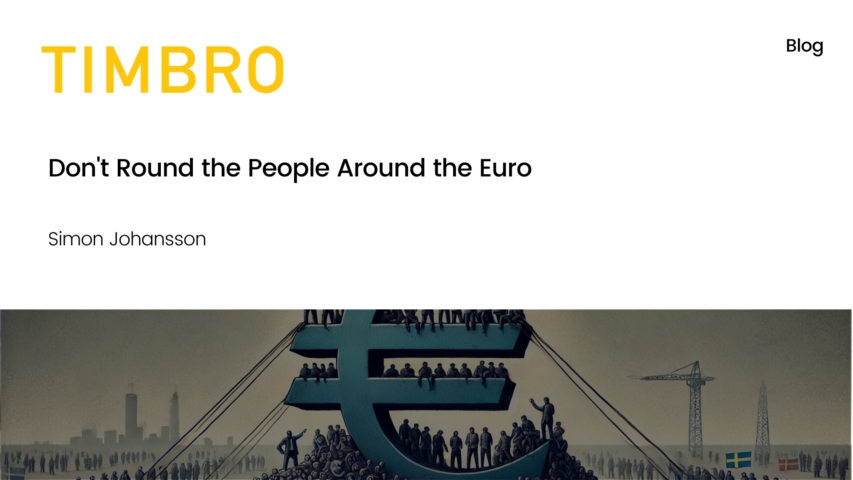Don’t Round People Around the Euro

Don't Round People Around the Euro
Simon Johansson // 6 November 2024
Euro advocates have renewed wind in their sails, with new supporters joining their cause. Economist Lars Calmfors, who studied the question of Euro entry in the 1990s and then advised waiting, has now changed his stance and believes the time is right for membership. Business leader Christer Gardell and Sven-Olov Daunfeldt, Chief Economist of the Confederation of Swedish Enterprise, have also switched from opponents to advocates.
The timing of this debate reigniting is not surprising. The Swedish krona has been depreciating for some time, reducing purchasing power. However, when considering your view on the Euro, it’s not the economists you should focus on. Instead, it’s important to reflect on your views regarding further European integration. Ultimately, the Euro is a political issue – something Lars Calmfors also highlights as a key argument for membership.
In 1994, the Swedish people voted to join the European Union, based on the Maastricht Treaty. Since then, the Nice and Lisbon Treaties have led to deeper European integration. Both of these treaties faced challenges in countries that held referendums. Had Sweden held similar referendums, a comparable outcome would have been likely.
The Swedish public remains sceptical about further European integration. Although support for EU membership is at an all-time high, this has not translated into support for a European federation.
It is within this context that the Euro should be considered. While it has clear economic implications, the political consequences are just as significant. The ultimate goal of the EU and its predecessors has always been to move towards a European federation. For now, this discussion has been paused due to Brexit, but it is only a matter of time before it resurfaces.
In the long run, the differing views on integration will likely be resolved by a multi-speed Europe, where those countries that wish to move towards a federation can do so, while others remain content to cooperate on the single market and foreign relations with non-EU countries.
The Euro will be a key part of this inner circle. The question for Sweden is whether it should join. Membership would mean accepting joint European decision-making in more areas, but it would also give Sweden a seat at the decision-making table. As Stefan Ingves has noted about being outside the Euro: “You have to wait while the others decide and listen to what they’ve decided when they come out of the boardroom.”
Swedish politicians have previously chosen to consult the public on major decisions regarding further integration with the European Union. You may have your own views on referendums – whether they are a blunt tool and a distortion of representative democracy – but the precedent has been set. To avoid consulting the public now, out of fear of the outcome, would be a betrayal.
The Liberals want to bypass the Swedish people and introduce the Euro without a referendum. The Moderates and Social Democrats are also starting to open the door to membership. However, any party that currently, or in the future, supports Sweden joining the Euro should at least take a clear stance and present the issue in a parliamentary election.
Economists can make strong arguments for joining the Euro, but it remains, at its core, a political issue. It is in that light that it should be evaluated and debated by the public, who will ultimately deliver their verdict at the ballot box. It’s time for the political parties to stop dodging the Euro issue.
This blog was originally published by Timbro in Swedish.
EPICENTER publications and contributions from our member think tanks are designed to promote the discussion of economic issues and the role of markets in solving economic and social problems. As with all EPICENTER publications, the views expressed here are those of the author and not EPICENTER or its member think tanks (which have no corporate view).



